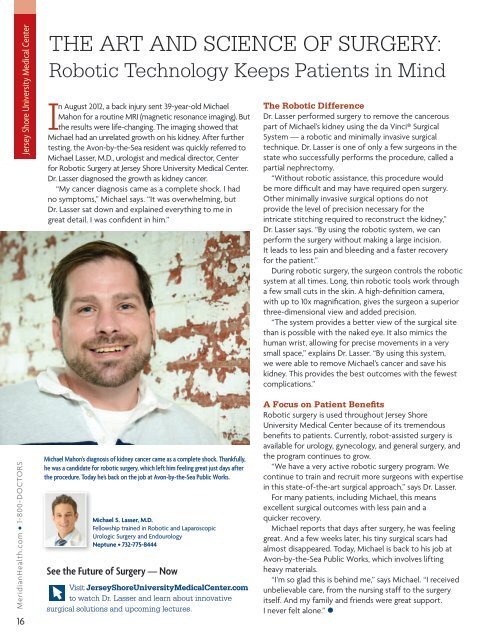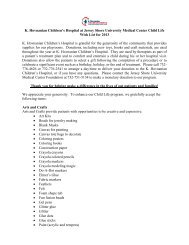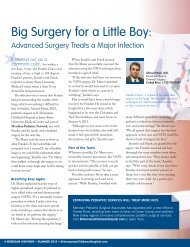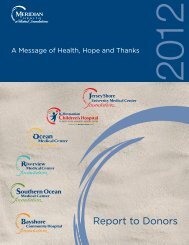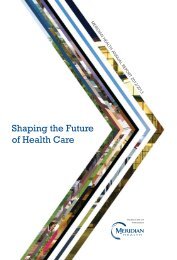Download the January/February Issue - Jersey Shore Medical Center
Download the January/February Issue - Jersey Shore Medical Center
Download the January/February Issue - Jersey Shore Medical Center
Create successful ePaper yourself
Turn your PDF publications into a flip-book with our unique Google optimized e-Paper software.
<strong>Jersey</strong> <strong>Shore</strong> University <strong>Medical</strong> <strong>Center</strong><br />
The Art and Science of Surgery:<br />
Robotic Technology Keeps Patients in Mind<br />
In August 2012, a back injury sent 39-year-old Michael<br />
Mahon for a routine MRI (magnetic resonance imaging). But<br />
<strong>the</strong> results were life-changing. The imaging showed that<br />
Michael had an unrelated growth on his kidney. After fur<strong>the</strong>r<br />
testing, <strong>the</strong> Avon-by-<strong>the</strong>-Sea resident was quickly referred to<br />
Michael Lasser, M.D., urologist and medical director, <strong>Center</strong><br />
for Robotic Surgery at <strong>Jersey</strong> <strong>Shore</strong> University <strong>Medical</strong> <strong>Center</strong>.<br />
Dr. Lasser diagnosed <strong>the</strong> growth as kidney cancer.<br />
“My cancer diagnosis came as a complete shock. I had<br />
no symptoms,” Michael says. “It was overwhelming, but<br />
Dr. Lasser sat down and explained everything to me in<br />
great detail. I was confident in him.”<br />
The Robotic Difference<br />
Dr. Lasser performed surgery to remove <strong>the</strong> cancerous<br />
part of Michael’s kidney using <strong>the</strong> da Vinci® Surgical<br />
System — a robotic and minimally invasive surgical<br />
technique. Dr. Lasser is one of only a few surgeons in <strong>the</strong><br />
state who successfully performs <strong>the</strong> procedure, called a<br />
partial nephrectomy.<br />
“Without robotic assistance, this procedure would<br />
be more difficult and may have required open surgery.<br />
O<strong>the</strong>r minimally invasive surgical options do not<br />
provide <strong>the</strong> level of precision necessary for <strong>the</strong><br />
intricate stitching required to reconstruct <strong>the</strong> kidney,”<br />
Dr. Lasser says. “By using <strong>the</strong> robotic system, we can<br />
perform <strong>the</strong> surgery without making a large incision.<br />
It leads to less pain and bleeding and a faster recovery<br />
for <strong>the</strong> patient.”<br />
During robotic surgery, <strong>the</strong> surgeon controls <strong>the</strong> robotic<br />
system at all times. Long, thin robotic tools work through<br />
a few small cuts in <strong>the</strong> skin. A high-definition camera,<br />
with up to 10x magnification, gives <strong>the</strong> surgeon a superior<br />
three-dimensional view and added precision.<br />
“The system provides a better view of <strong>the</strong> surgical site<br />
than is possible with <strong>the</strong> naked eye. It also mimics <strong>the</strong><br />
human wrist, allowing for precise movements in a very<br />
small space,” explains Dr. Lasser. “By using this system,<br />
we were able to remove Michael’s cancer and save his<br />
kidney. This provides <strong>the</strong> best outcomes with <strong>the</strong> fewest<br />
complications.”<br />
MeridianHealth.com • 1-800-DOCTORS<br />
16<br />
Michael Mahon’s diagnosis of kidney cancer came as a complete shock. Thankfully,<br />
he was a candidate for robotic surgery, which left him feeling great just days after<br />
<strong>the</strong> procedure. Today he’s back on <strong>the</strong> job at Avon-by-<strong>the</strong>-Sea Public Works.<br />
Michael S. Lasser, M.D.<br />
Fellowship trained in Robotic and Laparoscopic<br />
Urologic Surgery and Endourology<br />
Neptune • 732-775-8444<br />
See <strong>the</strong> Future of Surgery — Now<br />
Visit <strong>Jersey</strong><strong>Shore</strong>University<strong>Medical</strong><strong>Center</strong>.com<br />
to watch Dr. Lasser and learn about innovative<br />
surgical solutions and upcoming lectures.<br />
A Focus on Patient Benefits<br />
Robotic surgery is used throughout <strong>Jersey</strong> <strong>Shore</strong><br />
University <strong>Medical</strong> <strong>Center</strong> because of its tremendous<br />
benefits to patients. Currently, robot-assisted surgery is<br />
available for urology, gynecology, and general surgery, and<br />
<strong>the</strong> program continues to grow.<br />
“We have a very active robotic surgery program. We<br />
continue to train and recruit more surgeons with expertise<br />
in this state-of-<strong>the</strong>-art surgical approach,” says Dr. Lasser.<br />
For many patients, including Michael, this means<br />
excellent surgical outcomes with less pain and a<br />
quicker recovery.<br />
Michael reports that days after surgery, he was feeling<br />
great. And a few weeks later, his tiny surgical scars had<br />
almost disappeared. Today, Michael is back to his job at<br />
Avon-by-<strong>the</strong>-Sea Public Works, which involves lifting<br />
heavy materials.<br />
“I’m so glad this is behind me,” says Michael. “I received<br />
unbelievable care, from <strong>the</strong> nursing staff to <strong>the</strong> surgery<br />
itself. And my family and friends were great support.<br />
I never felt alone.” •


